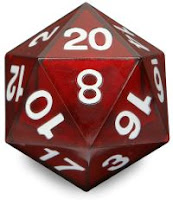I'm going to make three contradictory statements in a row.

- The pen and paper roleplaying industry is in decline. It has been for a long time, since the release of Magic: the Gathering in '93 which thinned the number of people already in the roleplaying scene by providing an alternative, addictive hobby in the form of collectible card games.
- The pen and paper roleplaying industry is in decline. It has been since the popularity of the internet spiked, and anyone with a scanner could upload an electronic version of a book, sharing it with the world, thus decimating book sales.
- The pen and paper roleplaying industry is in decline. It has been since massively multiplayer online roleplaying games came on to the scene, and stole the hearts and minds of kids who find their monster-slaying needs more than fulfilled by a monthly subscription.
Which of those three is true? To an extent, each of them. Yet the roleplaying industry persists.
In understanding why that should be so, we're faced with an underlying truth of marketing and economics. No matter how perfect a model we create to understand a market, it will still be innately less complex than the reality of a given situation. There are multiple caveats and addendums to the above three statements, for example, and counters to all of them.
- The CCG market isn't what it used to be, and can be considered a complimentary element to the roleplaying hobby not an opposition.

- E-publishing is bringing fresh ideas into the hobby by allowing indie products to come to prominence as never before.
- MMORPGs are sparking an interest in fantasy gaming bringing it further into the mainstream and attracting an audience that the roleplaying industry alone never could have.
So, there we have put a different take on each of the three causes of decline in the industry. Maybe you agree with one statement more than another, maybe you disagree with me entirely. Hey, feel free, the comments are just down below all this text, all views are welcome and nothing will be deleted.
But, despite how each of us feels about the above, I think we can all pretty much agree with the following two statements.
- We need people buying roleplaying products, or there is no roleplaying industry.
- We need need people playing roleplaying games, or there is no roleplaying hobby.
With that in mind, I find it difficult to dislike what Wizards are currently doing with D&D Next. Let me explain.
When Dungeons and Dragons 4th Edition came out, opinion was divided, to say the least. But it was clear that WotC were attempting to open up D&D, making it more accessible to a new generation of players who were more comfortable with the wargaming and MMORPG-like elements. And that new generation of players
is important to the industry, because nobody is immortal, and those of us who intend to roleplay and buy roleplaying products for the rest of our lives are not the only ones in the hobby. It's true, people drop out of the hobby. Sometimes to return later, sometimes not. Real life gets in the way, people decide it's not the best use of their time or will never be as engaging as when they were young. It's all very sad, but it's a fact, and we can't pretend otherwise.

So, did Wizards mess up by making 4th Edition something D&D wasn't? Opinions are very divided.
Will Wizards mess up by making D&D Next different again? All signs point to them not wanting to. Whether or not crusty old grognards will loosen their steely grip on their Tunnels and Trolls First Edition, and nervously reach towards the new D&D book, eyes bright and alive like they haven't been since the mid-70s, the industry will plod on without them. It pretty much has to.
Personally, I see the Forgotten Realms Sundering to be an attempt to make it so new people can get into that setting without reading eleventy-billion books (although the cynic in me does notice that Wizards are releasing eleventy-billion fiction books to get people up to speed on the new setting...).
It's a fine line, walking between pleasing the old crowd, and attracting a new one.
This post here is just the tip of the iceberg. I could write about this at greater length*. Instead, let's wrap up with a little slice of what the rest of the internet is saying about all this.
Erik Tenkar of Tenkar's Tavern suggests that D&D Next is shaping the way for the whole industry.
http://www.tenkarstavern.com/2012/08/where-d-goes-so-goes-hobby-so-whats-next.html
Andrew of the Iron-Bound Tome contends that changes to D&D would be more readily accepted if not done as part of a continuation of the editions (and that it's kind of sad).
http://ironboundtome.wordpress.com/2012/06/19/if-dnd-next-was-branded-as-a-new-game-would-it-sell-better/
Timothy Brannan of The Other Side played the whole gamut of D&D editions with his family at Gen Con, and loved it.
http://timbrannan.blogspot.com/2012/08/gen-con-recap-name-of-game-is-d.html
Share your thoughts below.
* But won't. Breathe a sigh of relief, dear readers.





